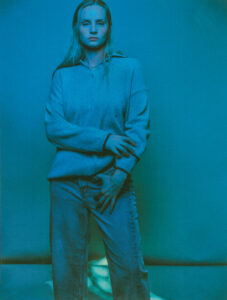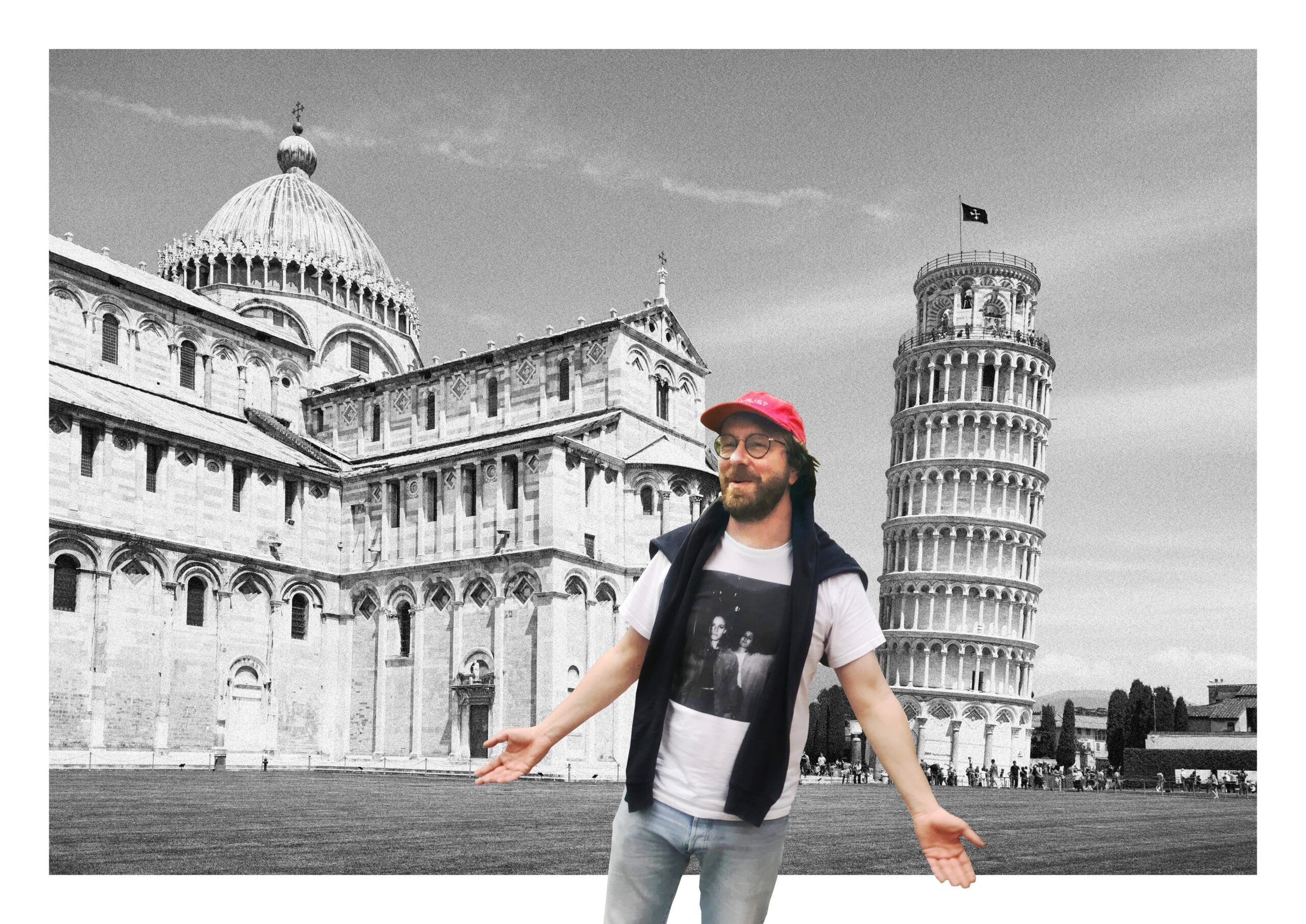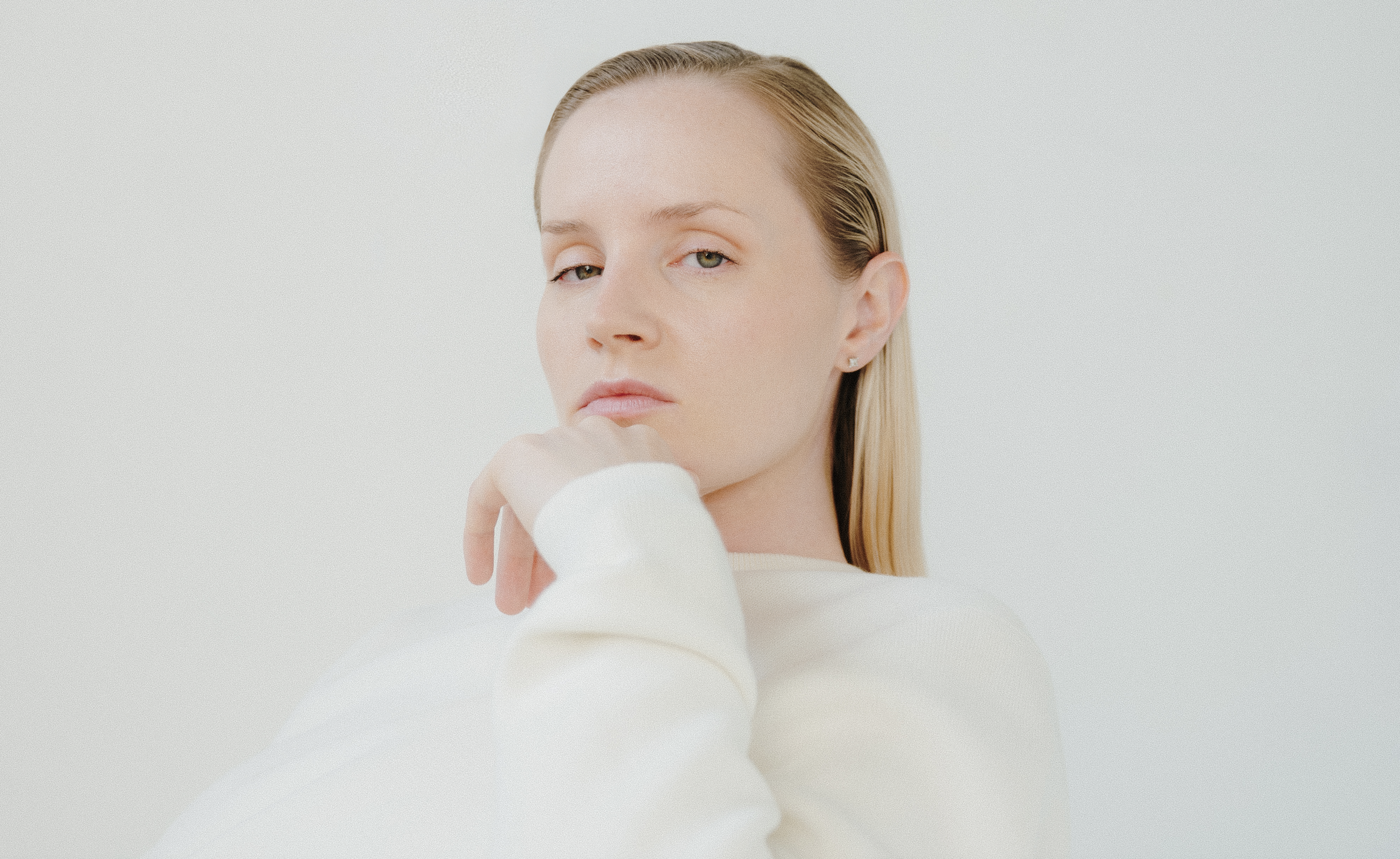Foto-© Jessica Foley
Die kanadische Singer-Songwriterin Charlotte Day Wilson hat bisher den Großteil ihrer Musik selbst produziert. Überzeugen von der besonderen Intimität, die dadurch entstanden ist, konnte man sich auf drei EPs und ihrem 2021 erschienenen Debütalbum Alpha. Am 03. Mai erschien ihr zweites Album Cyan Blue via XL Recordings − dieses Mal in enger Zusammenarbeit mit Justin Rochon enstanden. Sie verarbeitet vor allem Emotionen aus verschiedenen zeitlichen Blickwinkeln und Beziehungen zwischen Menschen, auch wenn sie schmerzhaft waren.
Wir haben kurz vor dem Release mit Wilson via Zoom gesprochen. Sie erzählt, warum sie sich außerhalb von Touren wenig mit ihrer eigenen Musik beschäftigt und es sie auf der Bühne dann doch manchmal überwältigt. Wir erfahren, warum Spaß und die Entziehung einer externen Bewertung die Kernelemente bei der Entstehung dieser Platte waren und kurz vor der Veröffentlichung dann doch das Außen so wichtig wird. Außerdem sprechen wir über ihre Besessenheit, mit verschiedenen Emotionen aus der Vergangenheit in Kontakt zu kommen, über die Angst des Abstumpfens und warum Farben ihre Musik beeinflussen. 
Your new record is coming out next week. What is your relationship to the songs at the moment? We are waiting, but you are in-between. How do you feel about them? Do you listen to them?
I haven’t really listened to the album since I had it mixed and mastered, but I’ve been thinking about it a lot, obviously, just like with the album coming out so soon. It has reentered my brain. There are a lot of things that people are going to hear for the first time. I have been living with these songs and these lyrics for a long time now. This is the scary part, bracing myself to share them with the world.
Yes, bracing yourself sounds scary. It there any form of euphoria as well?
Like anything that’s important to you, that you’ve worked hard on and that you care about, it’s going to be nerve-wracking to share it with the world because it means a lot to me. I think it’s natural nerves that come with it. But usually fear and nervousness means you’re stepping out of your comfort zone. I don’t think you can grow without those feelings. I always try to remind myself that whether it’s me going on stage and feeling nervous, or me putting out a project and feeling nervous, these are all character-building moments that help define my level of fearlessness as the will come.
Have you been bracing yourself while you were working on it? Have you been thinking about the finished product, the audience, the listeners, the journalists, all those people? Or does that come later in the process?
Yes, that comes later. This project was unique for me because I wasn’t thinking about what other people would think while I was making it. That made it a very liberating and fun experience. Those voices were in the room with me when I was working on previous projects. And now I’m just really, really fucking lucky and happy to have come to a place where that’s not the case anymore.
Why do you think that has changed?
Honestly, I think it was just natural maturation. I’ve been lucky enough to grow at a healthy pace in my career. Being an artist and being in the public eye is really unnatural and can be really hard to deal with psychologically and emotionally for the ego and for so many parts of your brain. It’s a lot to have the pressure of people expecting something from you and having that kind of attention. At this point, with a bit of perspective, I am very grateful that my career has grown at a steady pace rather than happening very quickly. I have been slowly chipping away where I continue to establish myself.

Many things were new to you when you were making this album. You let other people in more. You worked with shorter deadlines and less perfectionism. What was it that you took away from these changes?
Basically I was trying to get back to the basics of my creative process. I wanted to remember that I got into music because it was fun, because I had a good time just being in a room with friends making music, and before there was any pressure or expectation of what that music was going to be. I realised that you have to be conscious about it. You have to work through some things to get back to a tabula rasa, clean, empty state of mind to just have fun making music. I’m glad I did that work and got to a place where I knew if we’re having fun doing it, it’s going to be good. I don’t like my music if my association with making it was laborious and not good. Even if other people may not love a song, but I had a great time making it, I will always love that song.
The record is called Cyan Blue. Can you tell us more about that?
I had a synesthesia for the color between blue and green, or greens and blues in general. I had a visual lens that helped guide the creative process. I didn’t think I had it in the past, but I realized that I did. It was just for the colors orange and yellow. I was always making things that were orange and yellow in my mind. I just thought it was because I felt warm and rich with the music. But with this I realized that there was this very clear color palette that helped me make decisions with the music. If I was choosing between two sounds or we were experimenting with things, I would know exactly which one to do or how to shape a lyric based on whether it felt blue or not. I think it’s cool to build a visual element into an oratorical experience because it’s nice to build in the framework and the lens that I had for the listeners. They can go into it with the same visual palette. My eyes are the color green and blue and I sing a lot about wanting to be able to see through my eyes at different points in my life. It’s something I’m quite fixated on. I think that we are who we are from a very young age and connecting back to an inner child is one of my biggest pursuits. When I feel connected to my inner child, that’s when I feel the most happy and at peace and like I’m in the right place. There were just a lot of other elements at play for me. I found a lot of metaphors with this particular color in this world.

Going back and looking through your own eyes at a younger age sounds like chasing after that innocent viewpoint before life hit you. Do you think it’s possible to leave that baggage of experience behind? Or is it more about staying in a memory to re-access the emotions?
I don’t know if it’s possible, but I don’t know if that’s the point for me. Something that I find almost perplexing and a little bit sad is that, as you said, you can remember a memory, but you’ll never remember exactly how it felt. I don’t know why, but it’s something I long for. I long to go back and know what my emotional make-up was at certain moments in my life and understand how it felt in my body and in my soul. Maybe we’re not as in touch with ourselves when we’re younger, but I think it would be really interesting to know what it felt like. For example, when you listen to music as a child or as a teenager and it’s so powerful, it feels so big, or falling in love for the first time – those huge emotions we’ll never feel again. I like to be in touch with my feelings. I like to make sure that I feel. One of my biggest fears as an adult is that the range of emotions will feel like it’s getting smaller and smaller and you’ll have to roll off the highs and the lows in order to keep going and to survive and to be an adult. But I don’t want that. I want to feel the highs and the lows as much as I used to.
From a listener’s perspective, I can get in touch with these very big feelings more easily through music. It is not like the first time, but it brings me closer. As an artist, is music also a diary for your emotions?
It is. That’s why music is so powerful and that’s why I do it. There will be those moments when you’re on tour, you play a song, you do a good job, the audience claps, and you all feel good. Then there are some nights when something just hits you and you remember how you felt when you wrote that song and how big it was. It’s so overwhelming to have that physical experience during a performance. I get super emotional sometimes when I’m performing. I cry all the time when I’m performing because it’s so transformative. Music really recalls feelings in such a powerful way. It definitely brings me back sometimes.
Does your own music bring you back more than other people’s music?
No, I don’t really listen to my own music. The only time I listen to it is when I’m on tour and then it’s really big. But other music is also very powerful.
The album doesn’t just look back, it also looks forward. It really emphasizes the space in between. Everything behind you can be reassessed, but not really. You can imagine the future, but not really. How did you channel that feeling?
It’s something I need to work on more, because I have a bit of a fixation with different times in my life. Maybe some would say it’s a way of escaping what the present feels like. But I also think I wouldn’t have the amount of curiosity, acceptance and courage to think or imagine as vividly as I do if I wasn’t okay with where I am now. It’s twofold for me. I’m definitely in the best time of my life that I’ve ever been in. I feel the most confident, the most where I need to be. I think that’s what’s given me the freedom to think about the other things that I might have suppressed at other times in my life. It’s something I’m curious about. I’m always self-critical and curious about why I’m so fixated on what the future brings and what the past meant.

What I find very impactful when I listen to Cyan Blue is that you can shape these things. You can shape memory, you can shape your imagination of the future, but you can’t shape what’s happening now.
That’s true. It’s actually a very good read. Maybe it’s a coping mechanism because there’s more flexibility with how we remember or how we imagine when it’s just a reflection as opposed to a snapshot of where you are right now. It’s easier to transcend the reality of it.
One song that spoke to me in particular is New Day. It’s about the concept of queer motherhood. That’s such a complex, hurtful, but also a joyful topic. Can you tell us more about the writing of it and the process behind it?
I’m at a point in my life where I’m thinking about it. I think I want to have a child, but I don’t think I want to bear one. I don’t think I can see myself doing that. I don’t know if I’m brave enough. But knowing that I might not be genetically linked to this child is something I have to work through and prepare for. I want it to be something I’ve faced before, so I’m not working through it in real time. I want to be ready to be the best parent I can be for this child. I know that love is the most powerful thing. I’m just working through the feelings of having a child and maybe not having my genetics tied to that child, but as the song goes “you may not have my face, but you’ll have my name” and that’s a nature versus nurture feeling.
We talked about such dualities as past and future. There’s another one I noticed: You talk about yourself, you talk to yourself, but also with and about others. In Canopy or I Don’t Love You, for example. How do you approach these dialogues? Do you bring the person into the room with you in your head, or how does that work?
I think I do. I’m in this phase of wanting to connect with an inner child and I think part of what makes childhood so special is our ability to have crazy active imaginations. I feel like that fades over the years – our ability to sit in a room and completely imagine something and transcend reality. That’s what songwriting feels like to me sometimes. It lets me get into that place of complete and utter imagination and I don’t know how to describe it but I transcend whatever space I’m in and I go somewhere else. It gets to a place where it doesn’t feel like you’re looking. It just feels like everything is there, just waiting for you to pull from it. The relationships in my life are very important to me, whether they’re people who are still in my life or people who are no longer in my life. I still want to honor the things that were influential to me in those relationships. Sometimes the feelings are negative and hard to work through. But if they’re still coming to me subconsciously in this songwriting process, I feel like that means there’s still something to work through.
Where do the intentional and more technical parts come into play?
With the lyrics it’s not a conscious process. It’s about letting things flow through you and saying whatever comes to the tip of your tongue. But when it comes to producing, there’s usually a world of feelings and sounds and colors that I want to pull from. There is usually a reference point. I just know in my musical makeup what I’m influenced by, what feels right for that sentiment, and how to combine my influences and reinterpret things into my own sonic landscape.
Do you reinterpret your former work?
I don’t consciously do it, but I feel like it’s impossible to escape.
With your former records, you spoke about the importance of doing things on your own terms. What were your terms for Cyan Blue?
One of them was not allowing too many voices in the room. It was really just me and Jack [Rochon]. I didn’t want to show people the work in progress. We wanted to keep this our baby and protect it from the world and not let anybody else’s opinion dictate the state of the really fun creativity that we’re in. The whole approach was: first thought, best thought. Encouraging Jack not to be critical of himself and encouraging us both to just get into a state of play and fun.
Thank you for the interview!










